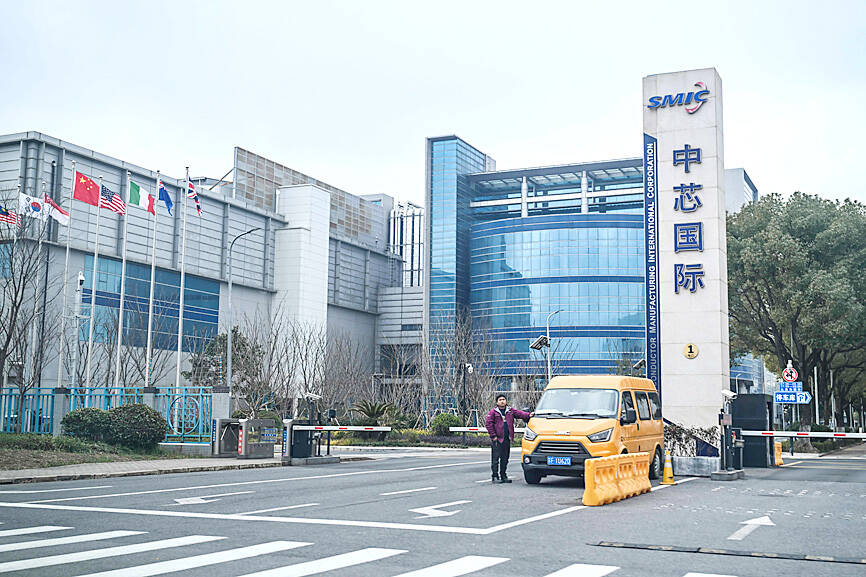Chinese chipmaker Semiconductor Manufacturing International Corp (SMIC, 中芯) “potentially” broke US law if it manufactured a processor for sanctioned telecom giant Huawei Technologies Co (華為), a senior US official said on Thursday.
US Undersecretary of Commerce for Industry and Security Alan Estevez was questioned about the 7-nanometer processor that SMIC made for Huawei during testimony before US lawmakers. When asked by US House of Representatives Foreign Affairs Committee Chairman Michael McCaul whether SMIC violated US controls, Estevez said “potentially, yes.”
The Chinese chipmaker’s shares slid as much as 5.5 percent in Hong Kong, its biggest intraday drop in about a month.

Photo: AFP
“We’ll assume that it was SMIC,” Estevez said. “I can’t talk about any investigations that may or may not be going, but we certainly share those concerns, and that’s certainly the reporting.”
Estevez described SMIC’s manufacturing process as “low-yield,” repeating past comments from commerce officials questioning China’s ability to produce advanced chips at scale and at a consistent performance threshold.
Estevez heads the agency’s Bureau of Industry and Security, which is responsible for chip export controls and sanctions that the administration if US President Joe Biden hopes will kneecap China’s semiconductor ambitions. Biden has introduced sweeping restrictions on the ability of Chinese companies to purchase advanced chips and chipmaking gear from US firms, and persuaded key allies including the Netherlands and Japan to introduce their own curbs.
Despite those efforts, Shenzhen, China-based Huawei managed to debut an advanced 7-nanometer chip in a smartphone that went on sale while US Secretary of Commerce Gina Raimondo was visiting China in August last year. The chip in Huawei’s Mate 60 device was manufactured by SMIC but relied heavily on technology from Dutch equipment giant ASML Holding NV and US gear makers including Lam Research Corp and Applied Materials Inc.
That equipment was exported to China before US and Dutch curbs limiting such transactions went into effect, Bloomberg News has reported.
“They did access tools before we put in our tool controls — not the highest-end tools, but the level just below that,” Estevez said. “Those tools will ossify over time and that process will be degraded.”
The US Bureau of Industry and Security in September last year said that it is probing the “purported” 7-nanometer chip, and Raimondo has vowed the “strongest possible” action to protect US national security.
The Biden administration is considering sanctioning Huawei’s secretive network of potential chipmaking partners, as well as a couple of firms officials say could purchase restricted equipment and sell it to the telecom giant.
US officials are also pushing their Dutch and Japanese counterparts to tighten their chip controls — and trying to persuade Germany and South Korea to join the arrangement, particularly to stem the flow of spare parts from those countries to China.

Nvidia Corp CEO Jensen Huang (黃仁勳) is expected to miss the inauguration of US president-elect Donald Trump on Monday, bucking a trend among high-profile US technology leaders. Huang is visiting East Asia this week, as he typically does around the time of the Lunar New Year, a person familiar with the situation said. He has never previously attended a US presidential inauguration, said the person, who asked not to be identified, because the plans have not been announced. That makes Nvidia an exception among the most valuable technology companies, most of which are sending cofounders or CEOs to the event. That includes

TARIFF TRADE-OFF: Machinery exports to China dropped after Beijing ended its tariff reductions in June, while potential new tariffs fueled ‘front-loaded’ orders to the US The nation’s machinery exports to the US amounted to US$7.19 billion last year, surpassing the US$6.86 billion to China to become the largest export destination for the local machinery industry, the Taiwan Association of Machinery Industry (TAMI, 台灣機械公會) said in a report on Jan. 10. It came as some manufacturers brought forward or “front-loaded” US-bound shipments as required by customers ahead of potential tariffs imposed by the new US administration, the association said. During his campaign, US president-elect Donald Trump threatened tariffs of as high as 60 percent on Chinese goods and 10 percent to 20 percent on imports from other countries.

Taiwanese manufacturers have a chance to play a key role in the humanoid robot supply chain, Tongtai Machine and Tool Co (東台精機) chairman Yen Jui-hsiung (嚴瑞雄) said yesterday. That is because Taiwanese companies are capable of making key parts needed for humanoid robots to move, such as harmonic drives and planetary gearboxes, Yen said. This ability to produce these key elements could help Taiwanese manufacturers “become part of the US supply chain,” he added. Yen made the remarks a day after Nvidia Corp cofounder and chief executive officer Jensen Huang (黃仁勳) said his company and Taiwan Semiconductor Manufacturing Co (TSMC, 台積電) are jointly

MARKET SHIFTS: Exports to the US soared more than 120 percent to almost one quarter, while ASEAN has steadily increased to 18.5 percent on rising tech sales The proportion of Taiwan’s exports directed to China, including Hong Kong, declined by more than 12 percentage points last year compared with its peak in 2020, the Ministry of Finance said on Thursday last week. The decrease reflects the ongoing restructuring of global supply chains, driven by escalating trade tensions between Beijing and Washington. Data compiled by the ministry showed China and Hong Kong accounted for 31.7 percent of Taiwan’s total outbound sales last year, a drop of 12.2 percentage points from a high of 43.9 percent in 2020. In addition to increasing trade conflicts between China and the US, the ministry said